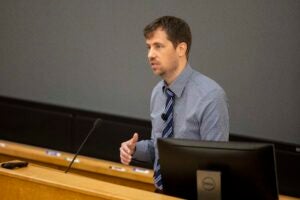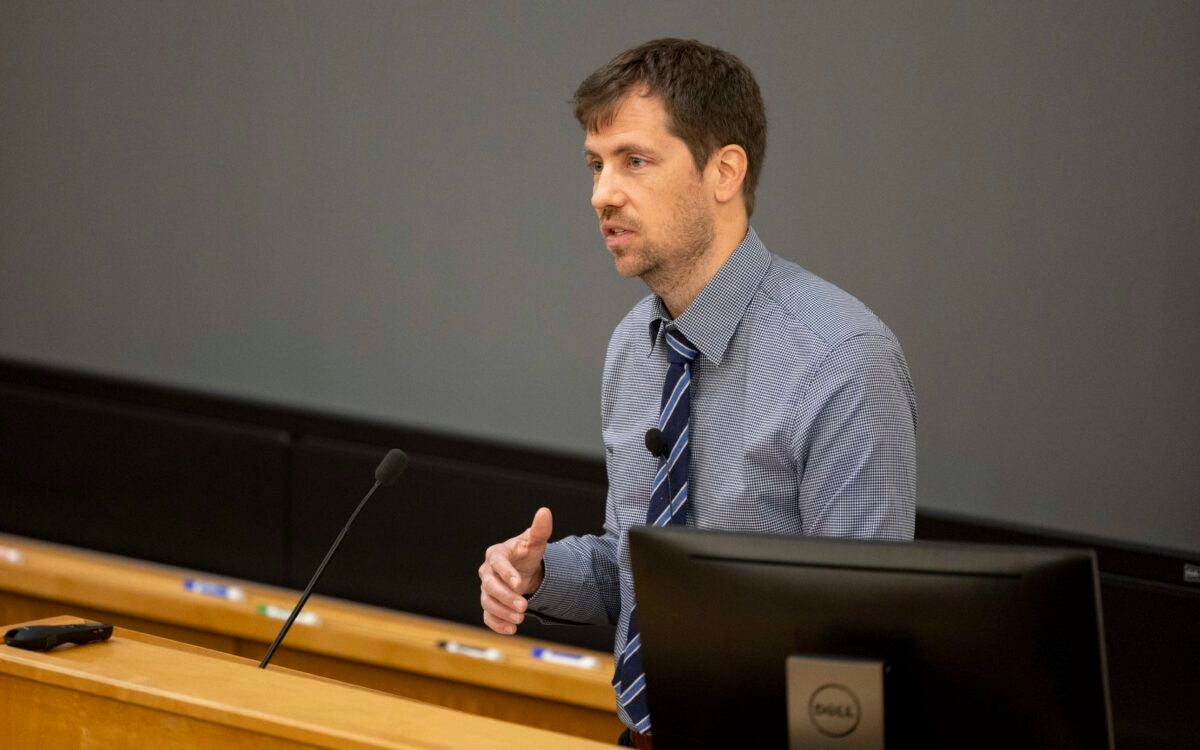Jackson raps abundance of ‘experts’
In 1973, Shirley Ann Jackson became the first black woman to receive a Ph.D. in physics from the Massachusetts Institute of Technology.
Decades – and 38 honorary degrees – later, Jackson is the president of Rensselaer Polytechnic Institute in upstate New York. Her resume includes time as a university researcher (in theoretical elementary particle physics); a corporate scientist (at AT&T Bell Laboratories); and a government regulator (as chairwoman of the U.S. Nuclear Regulatory Commission from 1995 to 1999).
Jackson delivered the Gustav Pollak Lecture last week (Feb. 22) at the John F. Kennedy Jr. Forum, an annual event sponsored by the Institute of Politics at Harvard’s Kennedy School of Government. “Her father told her to aim for the stars,” said Kennedy School Dean David T. Ellwood of his guest. “She’s probably among the few people here who knows what’s inside of stars.”
Jackson’s lecture, “Science and Leadership: The Imperative,” drew a picture of a world that is facing what she called critical “knife-edge” issues like global warming and global energy security. Solutions demand both scientific innovation and informed public policy, said Jackson. “It’s necessary for science and leadership to coalesce in ways we have not seen before.”
Yet at the same time, the United States is not putting enough money into basic research, or addressing a looming crisis in scientific talent. Jackson warned of an impending “bulge” in retirements that could soon strip laboratories and regulatory agencies of senior scientists who came of age in the 1960s. In the meantime, she said, too few young scholars in engineering and science are lined up to replace them. It’s what Jackson called “the quiet crisis.”
At the same time, she said, there’s been a decline in international science students who come to U.S. universities and pursue their careers here.
Meanwhile, science itself is under fire worldwide. It faces the growing doubts of a public whose skepticism is deepened by the Internet – “an engine of information and disinformation without parallel,” said Jackson.
She reached back into history – to the Greek agora, or marketplace – for an example of an “old model” of workable public discourse. During the time of Homer, the agora was a critical feature of the Greek city-state – an open-air crossroads where the public was exposed to voices from government, religion, and academics.
But in the modern age, said Jackson, the number of “experts” has exploded. They come from think tanks, the media, academe, and professional societies, and have flooded our new agora, the Internet. “Threading through this array of opinion,” she said, is increasingly difficult.
The special problem of the Internet is that there is suddenly an expert to support every view – and that has eroded “the authoritative voice of science,” said Jackson. “In this environment,” she asked, “how does the public choose its truth,” or make its policy decisions?
While public faith in science is fading, policymakers need good science more than ever, said Jackson. In a meeting in Paris this February, the Intergovernmental Panel on Climate Change concluded that mankind has a major hand in global warming. That’s “an entry point to understanding we must find the leadership to make change,” she said.
Science-driven public policy changes are knife-edged because they represent dilemmas. Jackson reached back into history again for an example: When Winston Churchill converted the British fleet from coal to oil during World War I, he made the ships faster, and gave them greater tactical range. But at the same time, his science-based policy decision forced Great Britain – and soon the West – to depend on unstable regions of the world for this essential resource.
Churchill created the problem, but he may have provided the solution, too. He wrote that safety and certainty in oil supplies lay in “variety and variety alone” – and 90 years later, variety could ease the problem of modern global energy security, which Jackson called “the central challenge of our time.”
Global energy supplies and systems are most stable and sustainable when there is a variety of energy sources, she said. That includes the known (oil, coal, coal shale, solar, wind); the little-known (vast deep-sea reserves of methane hydrates, a kind of natural gas); and the controversial (nuclear).
For nuclear power, one edge of the knife is optimistic, said Jackson, a physicist. About 20 percent of U.S. electricity – and 75 percent of its emissions-free power – comes from nuclear sources. France, with 59 nuclear power plants, has a surplus of electricity, and the lowest carbon emission rates in the European Union. Radioactive isotopes are used worldwide in medicine, to mutate new plant varieties, and even to track groundwater pollution.
On the other edge of the knife, concerns over nuclear safety have only intensified in a post-9/11 world, said Jackson. In the five years before the attacks, there were 1,500 thefts of radioactive materials worldwide; half were never recovered. Another 70 sources go missing every year, and smuggling attempts involving radioactive isotopes are on the rise. North Korea, Pakistan, Iran – all present or prospective nuclear powers – are politically troubling.
The nuclear dilemma needs science to arrive at an answer that promotes benefits and mitigates risks, said Jackson. It’s just one of many scientific policy challenges that underscore why those in power should promote “a cultural shift to value science, and those who do it,” she said.
For one, that means investing in math, science, and engineering talent – the human capital that provides imaginative solutions for vexing public issues. “Without innovation, we fail as a nation, and as a world,” said Jackson.
That needed cultural shift also requires investing in better science education, starting in grade school. To show youngsters that science is cool, impacts the world, and creates wealth, she said, “you have to grab them early.”




